|
How the Fakir Got the Name 'Sai' |
When the marriage-party came to Shirdi, it alighted at the foot of a Banyan tree in Bhagat Mhalsapati's field, near Khandoba's temple. The carts were loosened in the open courtyard of Khandoba's temple, and the members of the party descended one by one, and the Fakir also got down.
Bhagat Mhalsapati saw the young Fakir getting down and accosted Him "YA SAI" (Welcome Sai)! Others also addressed Him as "Sai" and thenceforth, He became 'Sai Baba'. |
|
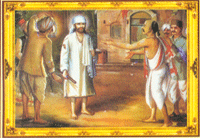 |
|
|
|
Baba's love for songs and dance |
In the company of soujourning devotees and fakirs, he would dance and sing melodiously, with small trinklets tied around his ankles. The songs he sang were mostly in Persian or Arabic which the local peoplecould not understand. Sometimes he sang the more popular songs of Kabir. This went on till as late as 1890.
He encouraged his devotees to sing kavvalis and kirtans and to chant the attributes of god incessantly for seven days on end. |
|
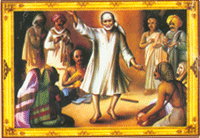 |
|
|
|
Baba Begging Food |
Blessed are the people of Shirdi, in front of whose houses, Baba stood as a beggar and called out, "Oh Mai, give Me a piece of bread !" and spread out His hand to receive the same. In one hand He carried a Tumrel (tinpot) and in the other a Zoli or Choupadari, i.e., a rectangular piece of cloth
Some days He went a few rounds and on the other days up to twelve noon. The food thus collected was kept in a earthen pot. Dogs, cats and cows freely ate from it and Baba never drove them away. |
|
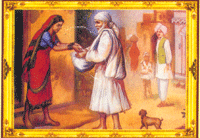 |
|
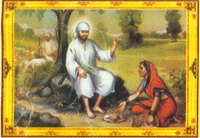 |
Baijabai's Brilliant Service |
|
Tatya Kote's mother, Baijabai, used to roam daily at noon in jungles and insisted Baba to partake of the lunch. Her service, Upasana or penance, by whatever name we call it, was never forgotten by Baba till the end. Both the son and mother, had great faith in the Fakir, Who was their God.
After some years Baba left going into the woods and began to live in the village, and take His food in the Masjid, hence Baijabai's toubles of roaming in the jungles ended.
|
|
|
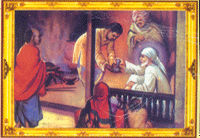 |
Greatness of Udi |
|
Baba took dakshina from all and out of the amount thus collected, He spent on charity and purchased fuel. This fuel He put in the dhuni - the sacred fire, which He kept ever burning. The ash from this fire was called Udi, and it was freely distributed to the devotees, at the time of their departure from Shirdi.
Baba gave Udi as Prasad, besmeared some of it on their foreheads and placed His boon-conferring hand on them. When Baba was in a cheerful mood He used to sing merily. One such song was about Udi. The meaning of this songs was :"Oh playful Ram, come, come and bring with you sacks of Udi," Baba used to sing in very clear and tender tones.
So besides the spiritual implication of Udi, it had also its material significance. It confered health, prosperity, freedom from anxiety and many other worldy gains.
|
|
|
|
|
|
|
|
|
